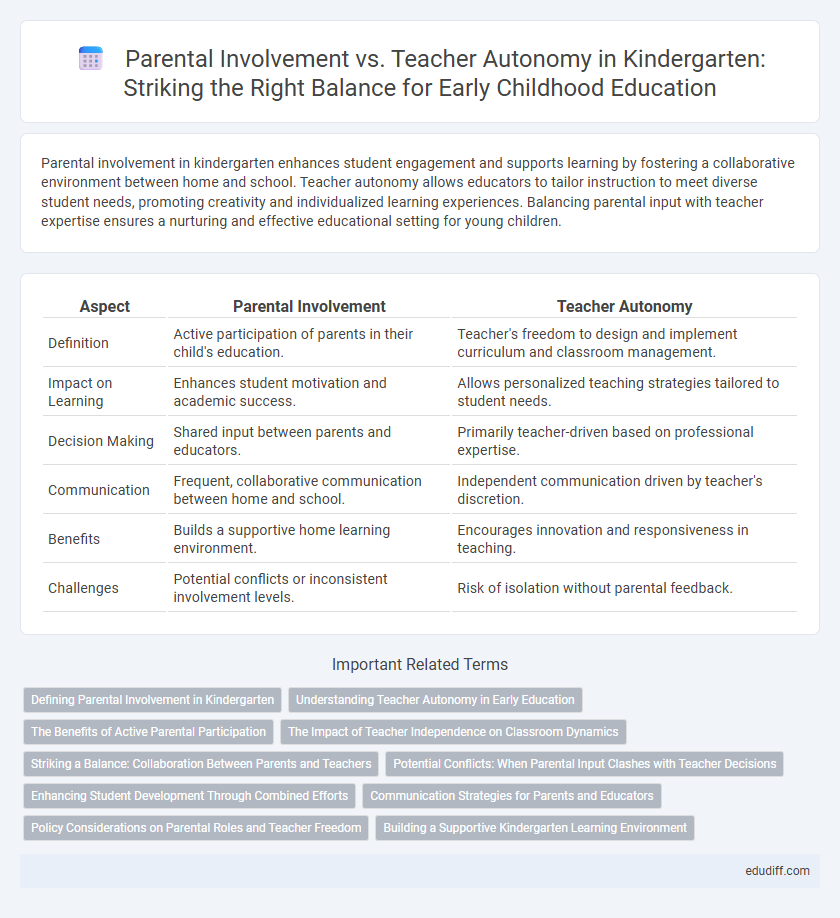Parental involvement in kindergarten enhances student engagement and supports learning by fostering a collaborative environment between home and school. Teacher autonomy allows educators to tailor instruction to meet diverse student needs, promoting creativity and individualized learning experiences. Balancing parental input with teacher expertise ensures a nurturing and effective educational setting for young children.
Table of Comparison
| Aspect | Parental Involvement | Teacher Autonomy |
|---|---|---|
| Definition | Active participation of parents in their child's education. | Teacher's freedom to design and implement curriculum and classroom management. |
| Impact on Learning | Enhances student motivation and academic success. | Allows personalized teaching strategies tailored to student needs. |
| Decision Making | Shared input between parents and educators. | Primarily teacher-driven based on professional expertise. |
| Communication | Frequent, collaborative communication between home and school. | Independent communication driven by teacher's discretion. |
| Benefits | Builds a supportive home learning environment. | Encourages innovation and responsiveness in teaching. |
| Challenges | Potential conflicts or inconsistent involvement levels. | Risk of isolation without parental feedback. |
Defining Parental Involvement in Kindergarten
Parental involvement in kindergarten encompasses active participation in children's learning activities, communication with teachers, and supporting development at home, creating a collaborative environment for early childhood education. It includes attending parent-teacher meetings, engaging in classroom events, and reinforcing learning objectives outside the school setting. This involvement significantly enhances student outcomes by fostering consistent support between home and school.
Understanding Teacher Autonomy in Early Education
Teacher autonomy in early education fosters tailored instructional strategies that address diverse developmental needs, enhancing classroom engagement and learning outcomes. Maintaining a balance between parental involvement and teacher autonomy supports children's holistic growth by integrating home insights while respecting professional expertise. Empowering teachers with decision-making authority encourages innovative practices essential for early childhood cognitive and social development.
The Benefits of Active Parental Participation
Active parental participation in kindergarten significantly enhances children's academic performance and social development by creating a supportive learning environment. Research shows that students with engaged parents exhibit higher motivation, improved behavior, and increased language skills, fostering a solid foundation for lifelong learning. Emphasizing collaboration between parents and teachers ensures consistent reinforcement of educational goals and personalized support tailored to each child's needs.
The Impact of Teacher Independence on Classroom Dynamics
Teacher independence in kindergarten classrooms fosters tailored instructional strategies, enhancing student engagement and adaptability to diverse learning needs. Autonomy empowers educators to make real-time decisions that create a supportive and responsive learning environment, positively influencing social-emotional development. Balancing parental involvement with teacher autonomy ensures consistent communication without undermining classroom management, ultimately improving educational outcomes for young learners.
Striking a Balance: Collaboration Between Parents and Teachers
Effective kindergarten education thrives on striking a balance between parental involvement and teacher autonomy, fostering a collaborative environment that supports child development. Parents provide essential insights into their child's needs and behaviors, while teachers apply professional expertise to tailor educational activities and curricula. Maintaining open communication and mutual respect ensures both parties contribute meaningfully to a nurturing and effective learning experience.
Potential Conflicts: When Parental Input Clashes with Teacher Decisions
Parental involvement in kindergarten often brings valuable insights but can create potential conflicts when parents' expectations clash with teacher decisions regarding curriculum or classroom management. Teachers maintain autonomy to implement developmentally appropriate practices tailored to the entire group, which may sometimes differ from individual parental preferences. Resolving these conflicts requires clear communication and mutual respect to balance parental input with professional expertise in early childhood education.
Enhancing Student Development Through Combined Efforts
Parental involvement and teacher autonomy both play crucial roles in enhancing student development in kindergarten settings. Research shows that when parents actively engage with teachers and reinforce learning at home, children exhibit improved social skills and academic performance. Empowering teachers with the autonomy to adapt curricula while collaborating with parents creates a balanced environment that fosters holistic growth in early childhood education.
Communication Strategies for Parents and Educators
Effective communication strategies between parents and educators in kindergarten foster a collaborative environment that supports children's development. Utilizing regular updates through digital platforms, parent-teacher meetings, and clear, empathetic dialogue enhances parental involvement while respecting teacher autonomy. Emphasizing transparent, two-way communication ensures alignment on educational goals and strengthens the partnership critical for early childhood success.
Policy Considerations on Parental Roles and Teacher Freedom
Effective kindergarten policies balance parental involvement with teacher autonomy to enhance early childhood education outcomes. Clear guidelines defining parental roles support collaboration without undermining teacher expertise or classroom management authority. Policies emphasizing respectful communication and shared decision-making foster environments where educators maintain instructional freedom while valuing family engagement.
Building a Supportive Kindergarten Learning Environment
Parental involvement enhances children's social and academic growth by fostering consistent support between home and kindergarten settings. Teacher autonomy allows educators to tailor learning experiences, addressing individual student needs and promoting creativity in the classroom. Combining active parental engagement with teacher independence creates a balanced, supportive learning environment that nurtures early childhood development effectively.
Parental involvement vs Teacher autonomy Infographic

 edudiff.com
edudiff.com